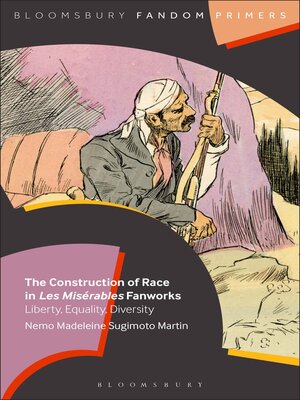The Construction of Race in Les Misérables Fanworks
ebook ∣ Liberty, Equality, Diversity · Bloomsbury Fandom Primers
By Nemo Madeleine Sugimoto Martin

Sign up to save your library
With an OverDrive account, you can save your favorite libraries for at-a-glance information about availability. Find out more about OverDrive accounts.
Find this title in Libby, the library reading app by OverDrive.



Search for a digital library with this title
Title found at these libraries:
| Library Name | Distance |
|---|---|
| Loading... |
By analyzing contemporary Les Misérables online fandom, how can we conceptualize fandom racism, especially when it complicates the typical and sometimes reductive narratives that assign racism to only the "bad" and the conservative "other"?
Victor Hugo's Les Misérables is a well-adapted novel with films, television shows, anime, and stage productions constantly bringing new fans into the fold. Fans of these adaptations use the political text as a breeding ground for contemporary political conversations about socio-economic inequality, republicanism, and gendered violence. Yet in these conversations, race is an awkward, silenced topic.
This primer presents findings from the author's study of a decade of Les Misérables fanart, in which they catalogue the formulation of racial identity in the fandom. Citing interviews with fans of color, they discuss the mechanics of how fandoms leverage concepts of "diversity" to downplay and ultimately silence criticisms in the name of fandom hegemony. They argue that despite using Hugo's barricade boys to process their white guilt, fan artists often see race as skin-deep and non-specific, rarely as active cultural or ethnic identities. This study of fan racism is held around moments of racial characterization that have convinced fans of color that "nothing changes, nothing ever will."
In looking at a fandom whose key principles are liberty, justice, and social equality, this research provides a base for future researchers and fans to have frank conversations about the subtle and thus more pernicious forms of racism that exist within fan spaces.
Victor Hugo's Les Misérables is a well-adapted novel with films, television shows, anime, and stage productions constantly bringing new fans into the fold. Fans of these adaptations use the political text as a breeding ground for contemporary political conversations about socio-economic inequality, republicanism, and gendered violence. Yet in these conversations, race is an awkward, silenced topic.
This primer presents findings from the author's study of a decade of Les Misérables fanart, in which they catalogue the formulation of racial identity in the fandom. Citing interviews with fans of color, they discuss the mechanics of how fandoms leverage concepts of "diversity" to downplay and ultimately silence criticisms in the name of fandom hegemony. They argue that despite using Hugo's barricade boys to process their white guilt, fan artists often see race as skin-deep and non-specific, rarely as active cultural or ethnic identities. This study of fan racism is held around moments of racial characterization that have convinced fans of color that "nothing changes, nothing ever will."
In looking at a fandom whose key principles are liberty, justice, and social equality, this research provides a base for future researchers and fans to have frank conversations about the subtle and thus more pernicious forms of racism that exist within fan spaces.







